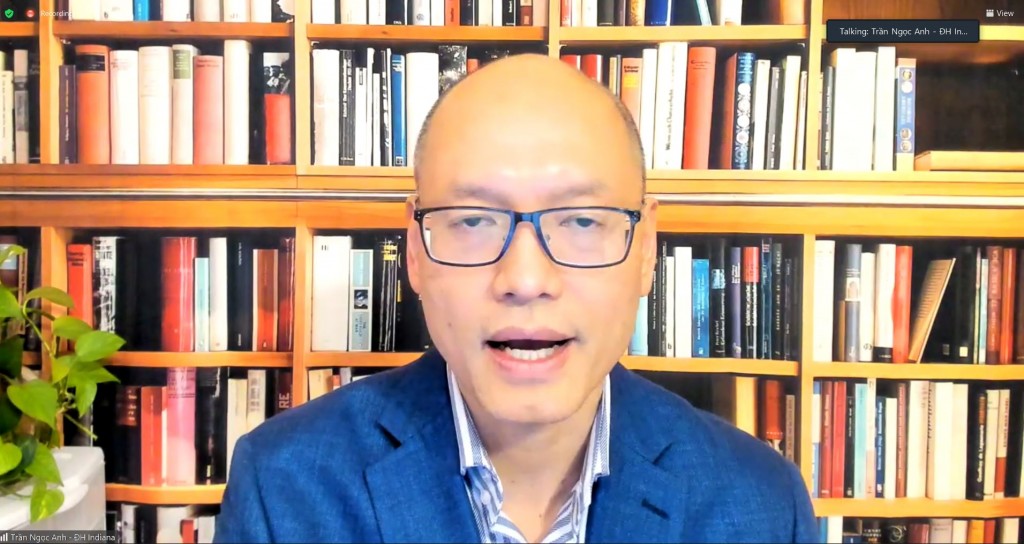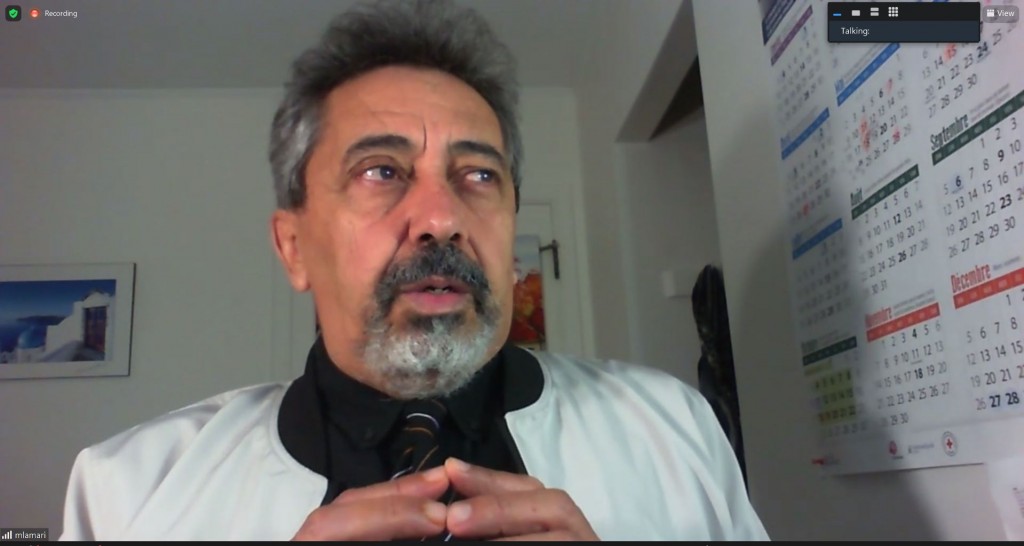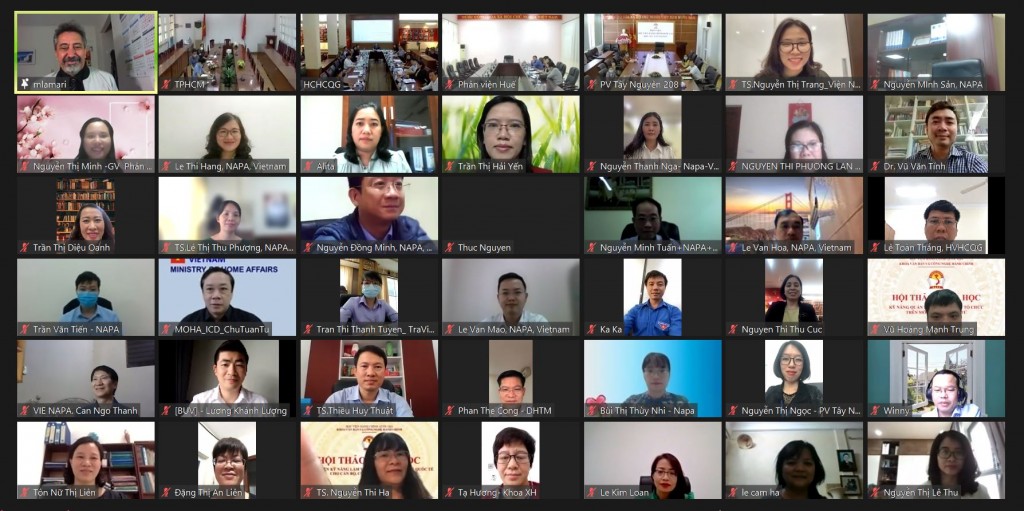On the morning of October 28, 2021 in Hanoi, the National Academy of Public Administration and the British University of Vietnam held an international workshop with the theme: “Policy formulation and implementation in the post-Covid-19 context”. The workshop was held virtually and co-chaired by Dr. Nguyen Dang Que, NAPA Vice President, and Dr. Christopher David Jeffery, Academic Director, British University Vietnam.
Attending the Workshop at NAPA Headquarter in Hanoi, there were Assoc.Prof.Dr. Luong Thanh Cuong – NAPA Vice President; Dr. Dang Thi Thu Hoai, Head, Department for Sectoral and Economic Studies, Director Central Institute for Economic Management, Dr. Nguyen Quynh Huy, Hanoi National University; leaders of NAPA faculties and departments. Attending virtually are Prof. Tran Ngoc Anh from Indiana University, U.S.A.; Prof. Moktar Lamari, National School of Public Administration (ENAP), Quebec, Canada; and more than 100 scholars from NAPA, embassies in Ha Noi, and other institutions.
Speaking in the opening remarks, Dr. Nguyen Dang Que stated that in response to the unprecedented challenges caused by the Covid-19 epidemic and its impacts on economic and social development, the Party and Government of Vietnam have taken resolute measures to control the situation, prevent the spread and outbreak of the Covid-19 epidemic, stabilize the economy, and ensure social security. The workshop is an opportunity for domestic and international experts, scholars, public managers to analyze the context, impacts as well as challenges of the Covid-19 epidemic on the world and on Viet Nam, to provide recommendations for renovating policy formulation and implementation to adapt to the unprecedented challenges posed by the Covid-19 pandemic. He expected that workshop participants focus on the following topics during discussion: the context and the impact of Covid-19 on Viet Nam and on the world; policy responses of Viet Nam and other countries to the Covid-19 epidemic; requirements and recommendations for renovating policy formulation and implementation for sustainable socio-economic development after Covid-19.
Speaking at the workshop, Prof. Dr. Tran Ngoc Anh from Indiana University, U.S.A. analyzed the impact of the pandemic and policy implications. He stated that given the constant changes and unpredictable impacts of the Covid-19 epidemic on the world, it is a must to constantly adjust assessments and forecasts in response to the pandemic. Prof. Tran Ngoc Anh proposed eight key solutions including short-term solutions such as restoring supply chains, tax and fee support for businesses, cash support for people, liquidity guarantee and long-term ones such as further investment in infrastructure, establishment of special working groups on FDI, promoting institutional reforms, economic restructure to create breakthroughs.
In the workshop presentation, Dr. Nguyen Quynh Huy, Hanoi National University assessed the impacts of the Covid-19 epidemic on Viet Nam’s economy and society and the decisions of the Governments of Viet Nam and other countries to stabilize the economy and ensure social security. Policy responses are fiscal policies, social security policies, epidemic prevention measures such as social distancing and vaccination. The Covid-19 epidemic has revealed limitations in digital transformation, accountability, policy making. However, this is an opportunity for the Government of Viet Nam to assess the capacity of the government agencies and public consensus in the prevention and control of the Covid-19 epidemic.

Dr. Dang Thi Thu Hoai, Central Institute of Economic Management delivering a presentation at the workshop
Dr. Dang Thi Thu Hoai from the Central Institute for Economic Management discussed the state of new normality, issues to be solved, and policy recommendations for sustainable socio-economic recovery and development after Covid-19. The Covid-19 pandemic has completely changed not only the socio-economic situation but also everyone’s habits, and resulted in strong application of digital economy, green economy, contactless economy, the movement of world supply chains from one country to another; changes in policies for environmental sustainability. Viet Nam is taking advantage of opportunities for digital economic development, participation in the global value chains, development of a new strategy for Covid-19 prevention and control which is “adaptive, safe, flexible, effective control of the Covid-19 epidemic”. Viet Nam is assisting producers and people to recover from the pandemic, speeding up the restructure, and taking advantage of post-pandemic opportunities.

Dr. Christopher David Jeffery, Academic Director, British University Vietnam delivering a presentation at the workshop
Dr. Christopher David Jeffery, Academic Director, British University Vietnam presents the UK’s experience in response to the Covid-19 epidemic. The UK is one of the early countries suffered heavy damage due to the Covid-19 epidemic and had to take measures to close some cities and areas. As a result early Covid-19 vaccination, UK students are gradually returning to daily life despite the high number of Covid-19 cases To help students to return to study after the period of online learning, the British Government has proposed measures such as organizing private tutoring, tuition support, accommodation support, medical isolation, and others. British University Vietnam seeks to improve the quality of online learning to ensure that the students who take the virtual training have the same level of training as those who take face-to-face courses.
Participating virtually in the workshop, Prof. Moktar Lamari, ENAP, Quebec, Canada; Assoc. Prof.Dr. Ngo Thanh Can, Former Vice Dean of Faculty of Administrative Sciences and Organization – Personnel Management; Dr. Mai Dinh Lam, NAPA Branch in Ho Chi Minh City all agreed that Viet Nam is a successful example in the prevention and control of the Covid-19 epidemic with the initiatives and activeness of the Government in responding to unpredictable changes of the pandemic. There are comments raised in the workshop such as development of criteria for epidemic prevention in localities; making policies to subsidize, create jobs, and improve skills for workers for economic recovery; formulation of a legal framework for a contactless economy.
Speaking at the conclusion and closing of the workshop, Dr. Christopher David Jeffery and Dr. Nguyen Dang Que affirmed that there is no single solution for epidemic prevention and control for all countries, but exchange of experience of countries is useful formulation of appropriate policies for a country. The workshop presentations focused on the main theme and its topic from different approaches and the opinions of participants in the workshop were not only valuable to Viet Nam but also other countries in the design and implementation of policies in the post-Covid-19 context.









